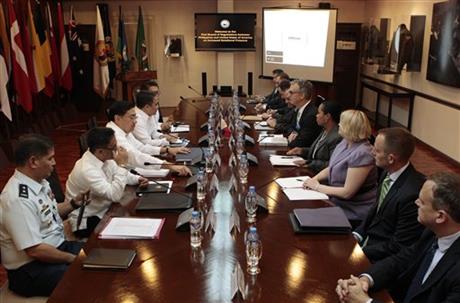
By JIM GOMEZ
FILE – In this Aug. 14 file photo, Philippine chief government negotiator Carlos Sorreta, 3rd from left, starts meetings with US Department of State Ambassador Eric John, 5th from right, at the Department of National Defense headquarters in suburban Quezon city, north of Manila, Philippines. The Philippine defense chief said Tuesday Nov. 5, 2013 that disagreements between U.S. and Filipino negotiators are prolonging talks on an accord allowing an increase in American military presence in the country. (AP Photo/Aaron Favila, File)
MANILA, Philippines (AP) — The Philippine defense chief said Tuesday that disagreements between U.S. and Filipino negotiators are prolonging talks on an accord allowing an increase in American military presence in the country.
Negotiations began in August on a defense agreement that would allow larger numbers of U.S. troops to have temporary access to Philippine military camps and bring in aircraft, ships and other equipment. U.S. troops have already been allowed to train Filipino anti-terrorism forces in the southern Philippines since 2002.
Defense Secretary Voltaire Gazmin said one key issue involves a U.S. failure to clearly accept Philippine control over and access to temporary American facilities to be set up in local camps.
“They can’t say yes or no but what will happen if we won’t have access? Those bases will look like their bases,” Gazmin said in a telephone interview.
“You can say there is a kind of an impasse, a disagreement,” he said, but added he was optimistic that the differences could be overcome.
U.S. Embassy officials did not immediately comment.
Philippine negotiators have been told to ensure that any agreement would comply with the Philippine Constitution and laws and that the U.S. would not have exclusive use of any facility established within selected Philippine military camps, Philippine officials have said.
There were also differences on how to word certain provisions of the agreement, Gazmin said.
The next negotiating session has not been scheduled. The differences mean an agreement may be reached next year at the earliest.
The Philippines’ desire to bolster its defense while engaged in territorial disputes in the South China Sea has dovetailed with Washington’s intention to pivot away from years of heavy military engagement in Afghanistan and Iraq to Asia.
Hundreds of American troops have been stationed in the southern Philippines for counter-terrorism training since 2002.
The presence of foreign troops is a sensitive issue in the Philippines, a former American colony. The Philippine Senate voted in 1991 to close down major U.S. bases. A pact ratified in 1999 allowed temporary visits such as joint exercises.



